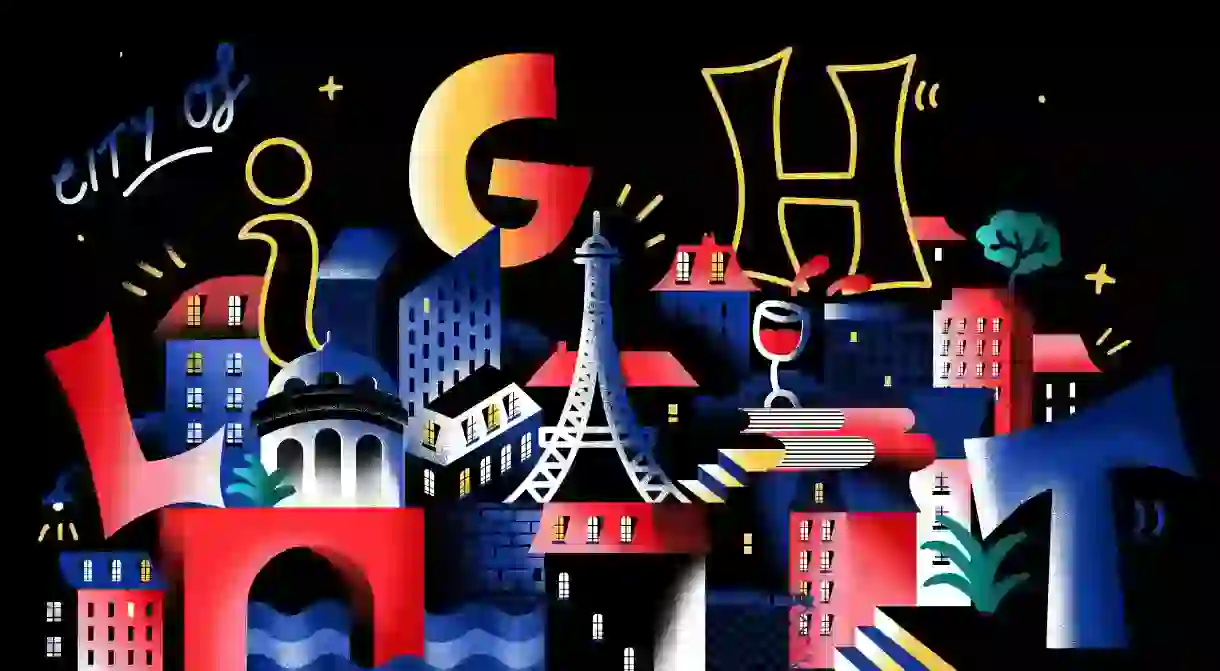How Paris Got Its Nickname, ‘The City of Light’

Paris is no stranger to nicknames, ‘Lutèce’, ‘Paname’, ‘Pantruche’ and even ‘the City of Light’. But have you ever wondered why? The reasons behind this sparkling nickname are a lot more different than you might expect.
There are many misconceptions about the ‘City of Light’ nickname
Before moving forward, let’s tackle any misconceptions about the aforementioned nickname. Most people assume that Paris is called ‘The City of Light’ because of its dazzling boulevards and bridges, and it’s easy to see why.

Today, there are over 296 illuminated sites in Paris, if you count everything from hotels and churches, statues and fountains, national buildings and monuments, and out of 37 major bridges in Paris, an impressive 33 of them are illuminated to full glory each sunset.
The city is especially well illuminated during the festive season, when over 2.4km of lights stretch from the Place de la Concorde right down to the Arc de Triomphe. It’s made even brighter with its 450 decorated trees along the avenue and on the pavement.
However, it’s Paris’s most famous landmark, the glittering Eiffel Tower, that’s mainly to blame for the misinterpretation. The monument shines like a beacon each night with 40km of illuminated garlands made up of 20,000 light bulbs.
How Paris really came to be called ‘The City of Light’
The real reason for the city’s name actually stems from the mid-17th century, when Louis XIV, otherwise known as Louis the Great (Louis le Grand) or the Sun King (Roi Soleil), was on the throne. After a prolonged period of war and domestic civil strife, the king was committed to restoring the public’s faith in law and order.

On March 15, 1667, Louis XIV made Gabriel Nicolas de la Reynie the Lieutenant General of Police, entrusting him with the task of making Paris more safe. In addition to quadrupling the number of policemen in the city, one of the measures was to install more lighting. Lanterns were placed on almost every main street and residents were asked to light their windows with candles and oil lamps. The idea was to prevent lawbreakers from dodging the police or hiding in dark alleys, therefore reducing the crime rate. From here on, the city gained the nickname La Ville-Lumière (‘The City of Light’).
At the time, Paris was one of the first European cities to adopt street lighting, but the nickname really gained the most traction during the Age of Enlightenment that followed.
Whilst some historians date the Age of Enlightenment between 1715 (the year that Louis XIV died) and 1789 (the beginning of the French Revolution), others say the movement was already present in Paris from the 1620s with the start of the scientific revolution.
From the late 18th century to the 19th century, the city of Paris became increasingly known as a centre of education and ideas throughout the whole of Europe, inspiring poets, philosophers, engineers and scientists galore. As well as the gradual increase in wattage, this context of innovation and enlightenment is what helped reinforce the symbolic significance of Paris as ‘The City of Light’.
Try these illuminating experiences in Paris
1st Day in Paris Discovery Private Tour
Historical Landmark

This customized trip offers an orientation to Paris and is ideal for first-time visitors. Learn about Parisian culture, navigate with ease, and discover important places. An ideal beginning to any trip to Paris. Discovering the unique areas of the French capital will become less mysterious when you’ve done this, as it’s the only way to really get to know the city.
Vintage 2CV Adventure: 2 -Hour Paris Secrets Tour
Cemetery

Experience a two-hour tour of Paris’s hidden beauties in a vintage 2CV automobile. With an informed guide, explore hidden locations, quaint streets, and lesser-known sites.
Explore the hidden gems of Paris in a classic 2CV car on this two-hour tour. Discover secret spots, charming streets, and lesser-known landmarks with a knowledgeable guide.Explore the hidden gems of Paris in a classic 2CV car on this two-hour tour. Discover secret spots, charming streets, and lesser-known landmarks with a knowledgeable guide.
Take in the view from the Tour Montparnasse
Building

Pay tribute to great writers at the Cimetière du Montparnasse
Cemetery

Although Père Lachaise receives the most attention, there are other noteworthy cemeteries in Paris. Pay your respects in the second-largest cemetery in the city, Cimetière du Montparnasse, to Charles Baudelaire, Jean-Paul Sartre, and Simone de Beauvoir. Its tidy avenues will be nearly empty if you visit early, maybe after grabbing a morning coffee from the Hexagone Café, which is close by. Get a map at the Edgard Quinet Boulevard gate to guide you to the tombs of the most well-known residents of the cemetery, including Serge Gainsbourg.
Descend deep into Paris's Catacombes
Cemetery














